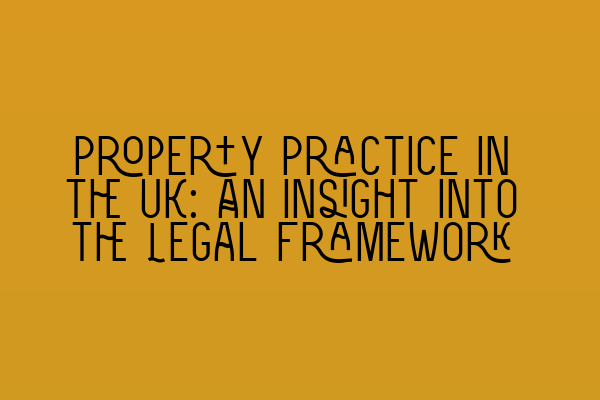Property Practice in the UK: An Insight into the Legal Framework
As a leading solicitor firm specializing in property law and land law, SQE Property Law & Land Law is committed to providing our clients with expert advice and assistance in navigating the complex legal framework surrounding property practice in the UK. In this blog post, we aim to give you a comprehensive overview of the legal principles and processes that govern property transactions in the UK. So, whether you’re a buyer, seller, landlord, or tenant, understanding the legal framework is crucial to protecting your rights and ensuring a smooth property transaction.
Title Deeds and Ownership
The starting point of any property transaction is establishing ownership. In the UK, property ownership is documented through title deeds. These legal documents provide evidence of ownership and contain vital information about the property, such as boundaries, covenants, and any rights or restrictions that may apply. Obtaining and reviewing title deeds is essential to establishing a clear title and avoiding any potential issues or disputes.
Conveyancing Process
The conveyancing process is the legal procedure through which ownership of a property is transferred from one party to another. It involves various stages, including the negotiation of terms, preparation of legal documents, conducting property searches, and finally completing the transaction. Each step is critical to ensuring a legally valid transfer of ownership, and it is advisable to seek professional advice from a solicitor to guide you through this process.
Property Searches
Property searches play a crucial role in the conveyancing process as they reveal valuable information about the property and its surroundings. These searches may include local authority searches, environmental searches, and drainage searches, among others. They help identify any issues that may affect the property, such as planning restrictions, environmental hazards, or potential liabilities. Conducting thorough property searches is essential in making informed decisions and avoiding any unpleasant surprises in the future.
Leasehold and Freehold Properties
In the UK, properties can be classified as either leasehold or freehold. Freehold properties grant the owner full ownership rights, including ownership of the land on which the property is situated. Leasehold properties, on the other hand, involve a lease agreement between the owner (landlord) and the occupier (tenant). Leasehold properties often come with additional responsibilities and restrictions, such as the payment of ground rent and service charges. Understanding the differences between leasehold and freehold properties is crucial when considering a property purchase.
Landlord and Tenant Law
Landlord and tenant law governs the relationship between property owners (landlords) and occupants (tenants). It sets out the rights and responsibilities of both parties and provides a framework for resolving disputes. This area of law covers important aspects such as tenancy agreements, rent collection, repairs and maintenance, evictions, and tenant rights. Whether you are a landlord or a tenant, understanding your legal obligations and rights is vital to maintaining a harmonious and legally compliant tenancy.
Planning and Development
The planning and development process is an essential consideration for individuals and businesses looking to undertake construction or alteration works on a property. Local authorities have the power to grant or refuse planning permission, and it is vital to ensure compliance with planning regulations to avoid legal consequences. Additionally, if you are considering purchasing a property with development potential, it is essential to carry out due diligence and seek professional advice to assess the feasibility and risks associated with the project.
Residential and Commercial Property
Property transactions can involve either residential or commercial property. Residential property refers to properties used for private dwelling purposes, such as houses, flats, and apartments. Commercial property, on the other hand, includes premises used for business purposes, such as offices, retail spaces, and industrial units. Each category comes with its own set of legal considerations, and it is essential to seek specialized advice tailored to the specific property type.
In conclusion, understanding the legal framework surrounding property practice in the UK is crucial for anyone involved in property transactions. From establishing ownership through title deeds to navigating the intricacies of the conveyancing process, each step requires professional expertise and attention to detail. At SQE Property Law & Land Law, we pride ourselves on providing our clients with comprehensive legal services in property law and land law. Contact us today to ensure your property transaction is handled with utmost care and expertise.
Related Articles:
– SQE 1 Practice Exam Questions
– SQE 1 Practice Mocks FLK1 FLK2
– SQE 2 Preparation Courses
– SQE 1 Preparation Courses
– SRA SQE Exam Dates
